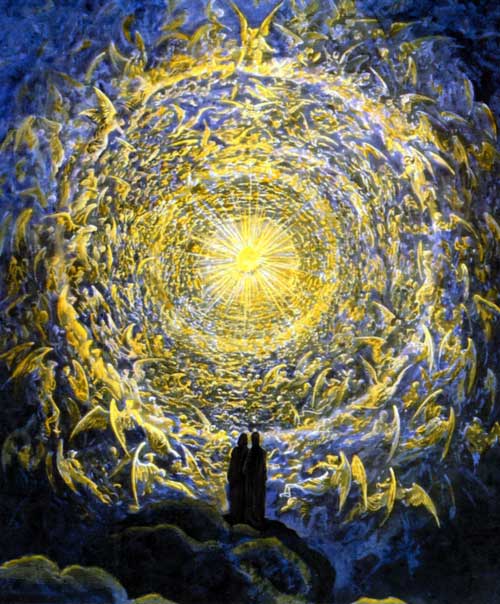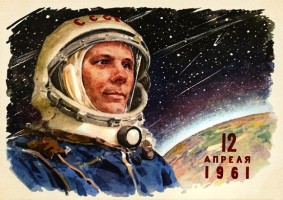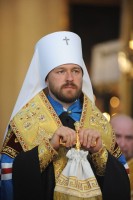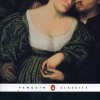“Love makes the world go round,” proclaimed a popular song of some years ago. The song was, of course, singing of romance, but to a man of the Middle Ages the words would ring true on a much higher level. In the thought of the immortal poet and theologian Dante, for example, it really was love which drives the whole universe. Man is the center of the earth, which is the center of the created world. Above it stretches a series of heavens, nine in number corresponding to the nine ranks of angels. The lowest heaven is that of the moon; then come the heavens of Mercury, Venus, the Sun, Mars, Jupiter, Saturn, the fixed stars and finally a ninth, crystalline, heaven. Above the outermost of these material heavens :is the spiritual heaven, the Empyrean, “the heaven flaming with fire or heat, not because there is any material fire or heat in it, but spiritual, to wit, holy love or charity.” (Dante, Letter to Can Grande). As Dante, the pilgrim of the Divine Comedy, is told by his guide Beatrice, this heaven “is pure light: light intellectual full of love, love of true good, full of joy, joy that transcends every sweetness.” (Paradise, xxx, 39-42). “This heaven has no other ‘where’ than the divine mind, wherein is kindled the love that revolved it, and the virtue which it rains down. Light and love enclose it in a circle, as it does the others, and this engirdment He alone Who girds it understands.” (xxvii, 109-114) Here also dwell the saints in the enjoyment of the vision of God.
 For Dante, following the philosophical conception of Aristotle, God is the great Architect of the universe, the Prime Mover, Himself unmoved. Below His spiritual Empyrean revolves the ninth and outermost of the material heavens, the crystalline heaven, which is called the primurn mobile, the first moving thing. “Because of the fervent desire of all of its parts to be united with the Empyrean heaven, the quiet heaven of peace, the Crystalline Heaven bums with the greatest intensity and moves the most rapidly.” (Ruth Mary Fox, Dante Lights the Way, Milwaukee: L Bruce 1958, p. 168) As Beatrice pointed out to Dante, “Look on that circle (the ninth heaven, the primurn mobile) which is most conjoined to [God], and know that its motion is so swift because of the burning love whereby it is spurred.” (Paradiso, xxviii, 43-45) Each of the material heavens is governed by heavenly intelligences, angelic powers. The highest rank of these is the Seraphim, who govern the ninth heaven, and who are animated by the greatest love for God. They receive power from Him and transmit it in turn to the heaven below them, whence it passes down to the next heaven, governed by the next angelic order, the Cherubim, and so on through the whole orb of creation. What literally keeps the whole universe turning is love, the love of God. This love is not only the motivating f0rce of creation, but its very reason for existence. God created everything out of nothing, for the sake of love, that His goodness might overflow into other beings, who share in it. His creation, the crown of which is man, is His splendor, His reflection shining as in a mirror. “In His eternity beyond time, beyond every other bound, as it pleased Him, the Eternal Love opened into new loves.” (Paradise xxix, 16-18)
For Dante, following the philosophical conception of Aristotle, God is the great Architect of the universe, the Prime Mover, Himself unmoved. Below His spiritual Empyrean revolves the ninth and outermost of the material heavens, the crystalline heaven, which is called the primurn mobile, the first moving thing. “Because of the fervent desire of all of its parts to be united with the Empyrean heaven, the quiet heaven of peace, the Crystalline Heaven bums with the greatest intensity and moves the most rapidly.” (Ruth Mary Fox, Dante Lights the Way, Milwaukee: L Bruce 1958, p. 168) As Beatrice pointed out to Dante, “Look on that circle (the ninth heaven, the primurn mobile) which is most conjoined to [God], and know that its motion is so swift because of the burning love whereby it is spurred.” (Paradiso, xxviii, 43-45) Each of the material heavens is governed by heavenly intelligences, angelic powers. The highest rank of these is the Seraphim, who govern the ninth heaven, and who are animated by the greatest love for God. They receive power from Him and transmit it in turn to the heaven below them, whence it passes down to the next heaven, governed by the next angelic order, the Cherubim, and so on through the whole orb of creation. What literally keeps the whole universe turning is love, the love of God. This love is not only the motivating f0rce of creation, but its very reason for existence. God created everything out of nothing, for the sake of love, that His goodness might overflow into other beings, who share in it. His creation, the crown of which is man, is His splendor, His reflection shining as in a mirror. “In His eternity beyond time, beyond every other bound, as it pleased Him, the Eternal Love opened into new loves.” (Paradise xxix, 16-18)
Adherents of the modern, scientific worldview laugh at this mediaeval view of the universe and regard it as ignorant, because it differs so radically froth their own. But it is the modern, scientific world now which is fundamentally wrong. It is wrong because it is merely modern, scientific and a world view. Being modern, it belongs to a period of time which is new and ephemeral; what is modern today is old-fashioned in a few years or a few centuries. True wisdom is timeless, because truth does not chance. What was true yesterday cannot be false today; what is true today cannot be false tomorrow. Today evil forces are intent on spreading the great delusion that truth is relative. If there is no constant, fixed and unchanging truth, however, then there is no truth at all.
Science, scientia in Latin, is knowledge. Knowledge requires a knower. Human knowledge is measured by the mind of man. The mind of man is finite, limited and changeable. The results of its endeavors are also finite, limited and changeable. The things science studies are also finite, limited and changeable. Yesterday’s scientific truth is dethroned by today’s new theories and discoveries. Hence, we cannot look to what is called science for real knowledge, knowledge of ultimate truths and everlasting verities These must come from outside the mind of man, from on high, from revelation, from God.
Modern man’s worldview is just that, a view of the world, what he sees, observes, measures and calculates. Everything in the world is constricted by time and space, besides being mortal and corruptible. All that forms a mere worldview, viewed from the vantage point of this world, is distorted and incomplete. It is as if I looked out my window and came to the conclusion that Kanata is the whole world, because I can see no farther. A worldview is limited by the inevitable prospect of a horizon. To get a true picture of the world, it must be viewed from above and outside. To borrow a phrase from a very different philosopher, it must be seen sub specie aeternitatis — under the aspect of eternity.
The true scientist is a careful and cautious man, who recognizes the boundaries of his knowledge and does not pretend to go beyond them. Such a man can easily acknowledge and submit to the God Who is above, beyond and behind all his science. Many outstanding scientists have been, and are, believers in God. Danger comes from some popularizers of science, those prophets of the mass media who serve some apparently impersonal forces, which in reality are orchestrated by the chief of the anti-God legions. These forces mock the system of Christianity. They seek to destroy faith in the living and loving God, replacing Him with belief in blind instinct, pure chance, and ceaseless change. They would replace religion, that which reunites man to God, by a system which, though it professes to be non-religious, is just as dogmatic as any religion. It is not science that is dangerous, but scientism, the cult of science.
Ultimately, we choose what we are willing to believe. I find the mediaeval explanation of things, profoundly Christian as it is, to be just as valid as conclusions based on the observations of later scientists, and far more satisfying. It is lofty poetry rather than tedious prose. Scientism has as its goal the liberation of man from all sorts of “outworn” religious beliefs. It professes to give man freedom through knowledge. But, if pursued, it leads not to the liberation of man, but to the destruction of man. If man is no more than a conglomeration of genetic material, governed by biological forces and destined only for death, which can be postponed but not avoided, and the only consolation is that everything may be evolving into something better, what is left of the nobility and freedom of man? If love is reduced to the pursuit of instinctive urges, how is man any better than an insect?
The sages of scientism start by preaching rebellion against God, by calling into question or denying His very existence, in the name of man. They have created the idea of modern man as the rebel, rejecting all conventions, traditions and received truths. But being a rebel is no glory for man. It puts him in the company of that arch-rebel, Satan, and the old Adam whom he persuaded to join in his rebellion.
To drag man down to hell alive, the devil seeks to convince man that there is no such thing as hell. He mocks it as a funny old myth of fire and brimstone. When this tactic is not successful, he tries to argue away hell as being unjust. He has succeeded in fooling even many Christians in this way.
If man is not the free, rational, moral creature that Christianity posits, then how can his actions be deserving of either praise or blame? Without reason and free will, human actions are either meaningless and random or inescapably predetermined. The same free capacity to love that moves all our actions enables us to reject love. Love requires that there be a hell. And so, hell is just as much a part of the Christian conception of the world as the earth and the heavens.
The denial of Love is the denial of love; the denial of God is the denial of love. In the intellectual storminess of our modern world, it is not God Who is at risk. (Though one who loves God must feel: Poor God! How little is He known, how little is He loved!) God will never be dead. God is above all change and suffering. In the language of theology, He is impassible, meaning, not subject to passion. (The word impassible must be distinguished from impossible –not possible, and from impassable -not able to be traversed.) He exists eternally, “now and ever and unto the ages of ages.” He does not need us to make Him happy, though He mysteriously condescends to our level, to suffer out of love for mankind and to redeem man by His love. What is at risk is man. Ironically, the last half of the twentieth century has been consumed by the fear of the destruction of the human race, whether by nuclear war or ecological catastrophe. We are fight to feel endangered, but the real danger lies in the destruction, not of the race, but of man himself, the abolition of man’s belief in man, the reduction of man to just another animal. We Christians are the true humanists, engaged in a mighty struggle to defend man against men.
In a fascinating book of philosophical essays which I may someday read, Of Time, Light and Hell, by Bohdan Chudoba (The Hague and Paris: Mouton 1974), I came across the following passage (p, 112):
“Not so many centuries ago, Dante was still allowed to place On the gate of hell an inscription which read: ‘The eternal love made me.’ In those days not only humble Christians but also intellectuals realized that, without the possibility of a definite ‘no’ (which is ‘hell’), as opposed to a definite ‘yes’ (which is ‘heaven’), there would be no men capable of real love, but only automatons, robots. It was still known then that love is the highest value in the universe.”
(Reprinted from The Monthly Newsletter Of Saint Xenia of Petersburg Russian Orthodox Church, Nepean, Ontario, Canada, December, 1995)

















